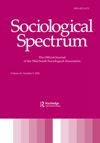“One big race”, narrow paths and Golden spoons: fatalistic narratives among young South Koreans
IF 1.1
3区 社会学
Q2 SOCIOLOGY
引用次数: 0
Abstract
Abstract Durkheim’s Le Suicide outlined two distinct types of suicide that depend on an individual’s level of social regulation. While one of these, anomie/anomic suicide has been greatly explored by both Durkheim and subsequent literature, the concept of fatalistic suicide has been neglected due to Durkheim’s own proclamation that it had little contemporary importance. In this article, I report narratives related to suicide gathered from interviewing South Koreans aged 20–30 that mirror elements of fatalistic suicide, such as violently blocked passions and oppressive discipline. South Koreans in this age group often discussed that they have constantly felt immense pressure from society to achieve particular life goals by certain ages, and not achieving these expectations essentially means that one’s life is over. Furthermore, I contend that achieving these lofty expectations, such as going to what is considered a prestigious university or getting a well-respected first job is hardly possible for the masses, and instead sets up many students and postgraduates for inescapable failure. The reaction to this failure of being able to meet goals and expectations can be understood in terms of Durkheim’s anomie, given that people’s goals can no longer be regulated by society once they have failed. This article posits that individuals move between extremes of Durkheim’s social regulation.“一个大种族”、狭窄的道路和金汤匙:韩国年轻人的宿命论叙事
摘要涂尔干的《自杀》概述了两种不同类型的自杀,这两种自杀取决于个人的社会调节水平。其中之一,失范/失范自杀在涂尔干和后来的文学中都得到了极大的探索,但宿命论自杀的概念却被忽视了,因为涂尔干自己宣称它在当代几乎没有什么重要意义。在这篇文章中,我报道了从采访20-30岁的韩国人中收集到的与自杀有关的故事,这些故事反映了宿命论自杀的元素,比如被暴力阻断的激情和压迫性的纪律。这个年龄段的韩国人经常讨论说,他们不断感受到来自社会的巨大压力,要求在特定年龄段实现特定的生活目标,而没有实现这些期望本质上意味着一个人的生活结束了。此外,我认为,实现这些崇高的期望,例如上一所著名的大学或获得一份受人尊敬的第一份工作,对大众来说是不可能的,反而会让许多学生和研究生不可避免地失败。人们对未能实现目标和期望的反应可以从涂尔干的失范来理解,因为一旦人们的目标失败,社会就无法再对其进行调节。这篇文章认为,个体在涂尔干社会规范的极端之间移动。
本文章由计算机程序翻译,如有差异,请以英文原文为准。
求助全文
约1分钟内获得全文
求助全文
来源期刊

Sociological Spectrum
SOCIOLOGY-
CiteScore
3.80
自引率
5.60%
发文量
16
期刊介绍:
Sociological Spectrum publishes papers on theoretical, methodological, quantitative and qualitative research, and applied research in areas of sociology, social psychology, anthropology, and political science.
 求助内容:
求助内容: 应助结果提醒方式:
应助结果提醒方式:


